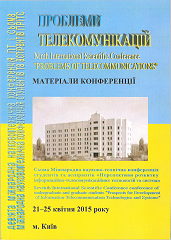МЕТОДИ ВІДБОРУ НАЙБІЛЬШ ІНФОРМАТИВНИХ СПЕКТРАЛЬНИХ КАНАЛІВ
Анотація
Methods for selection of the most informative spectral bands
In this work we analyzed different methods for selection of the most informative and most useful spectral bands. It was considered Fisher criterion, it’s modifications and criterion function of information capability of spectral bands. It was also proposed a new method to select spectral bands, which is based on the concept of new modified criterion function of information capability of spectral bands. It was shown, that the proposed new modified criterion function of information capability of spectral bands has advantages and gives more accurate results than other methods.
Посилання
Bandos T.V. Classification of Hyperspectral Images with Regulized Linear Disctiminant Analysis / T.V. Bandos, L. Bruzzone, G. Camps-Valls // IEEE Transactions оn Geoscience аnd Remote Sensing, Vol. 47, №3, 2009, 862-873 pp.
Попов М. Методы оптимизации числа спектральных каналов в задачах обработки и анализа данных дистанционного зондирования Земли / М. Попов, С. Станкевич // Современные проблемы дистанционного зондирования земли из космоса. М.: ИКИ РАН.-2006.- Т. 2, №1.- С. 61-63.
Mc Coy R.M. Fields Methods in Remote Sensing / R.M. Mc Coy // New York: Guilford Press, pp. 150-160, 2005.
##submission.downloads##
Як цитувати
Номер
Розділ
Ліцензія
Авторське право (c) 2017 Софія Іогановна Альперт

Ця робота ліцензується відповідно до Creative Commons Attribution 4.0 International License.
Authors who submit to this conference agree to the following terms:a) Authors retain copyright over their work, while allowing the conference to place this unpublished work under a Creative Commons Attribution License, which allows others to freely access, use, and share the work, with an acknowledgement of the work's authorship and its initial presentation at this conference.
b) Authors are able to waive the terms of the CC license and enter into separate, additional contractual arrangements for the non-exclusive distribution and subsequent publication of this work (e.g., publish a revised version in a journal, post it to an institutional repository or publish it in a book), with an acknowledgement of its initial presentation at this conference.
c) In addition, authors are encouraged to post and share their work online (e.g., in institutional repositories or on their website) at any point before and after the conference.

